Love in the time of lookalike contests
Camille investigates the viral trend as a case study in desire, asking doppelgängers and fans what they see in Timothée Chalamet—and each other

The fliers went up months before. “Timothée Chalamet lookalike competition,” they read, accompanied by a photo of the actor looking deadpan into the camera, overlaid with a QR code and the promise of a $50 cash prize. You may have heard what happened next: a raucous event that shut down by the cops; a surprise appearance from the actor himself; and in the middle of it all, a round of speed dating.
The viral event spurred a series of copycat competitions around the world. From London to San Francisco, pretty men with vaguely interesting features congregated in the hopes of being crowned the next Paul Mescal, Dev Patel or Jeremy Allen White—and the trend shows no signs of stopping. It begs the question: Why are we hell-bent on locating the Temu versions of male heartthrobs, and what does it say about the state of modern dating?
For this week’s story, I bring you a tale in three parts: an on-the-ground report on the Timothée Chalamet lookalike competition; my interviews with contestants, fans, and groupies, in which I attempt to understand the actor’s elusive appeal; and my analysis of what celebrity lookalike contests say about our desires.
PART I: The Competition
When I sent the flier to my friend Michael, urging him to compete, I didn’t know the Timothée Chalamet lookalike competition would go viral—I just thought it would be funny. I wasn’t the only one: “Three people have sent me this already,” he responded, bemused. “We’ll see.”
And we did see, when, a few short weeks later, we ended up part of the crowd milling around Washington Square Park, as the sound of police sirens wailed and a helicopter circled overhead. “There is nothing going on at the arch!” cops intoned hopelessly to the thousand-plus people congregated underneath it, iPhones aloft, as a slew of Chalamet lookalikes—and eventually, the real-life Chalamet—made their way through the crowd, or else were hoisted up on shoulders and chairs, the better to judge their resemblance from over a sea of faces. It was, to put it lightly, absolute chaos. “We need to find higher ground!” yelled one girl to another, making a break for a better view. As my boyfriend and I enter the fray, an old man stops us in our tracks: “Excuse me,” he says. “I just want to know. Who is Timothée Charlamagne?”
This is, in a way, the question on everybody’s lips—because in knighting a doppelgänger, one is not just judging their literal resemblance, but their ability to encapsulate the star’s vibe, mood, and aura. Each of the Temu Chalamets milling around had something of the star about him, whether it was the dark curly hair, the angular jaw, or the feminine, fae-like features. But if they had one physical attribute, they lacked another. The process of elimination—of deciding who looked the most like Chalamet—was an exercise in consensus building. And with completely normal, not terribly Chalamet-coded guys putting themselves forward in front of the committee, I couldn’t help but wonder: Do men even know what they look like? And what is it about Timothée Chalamet that makes him veritable catnip for women and gays?
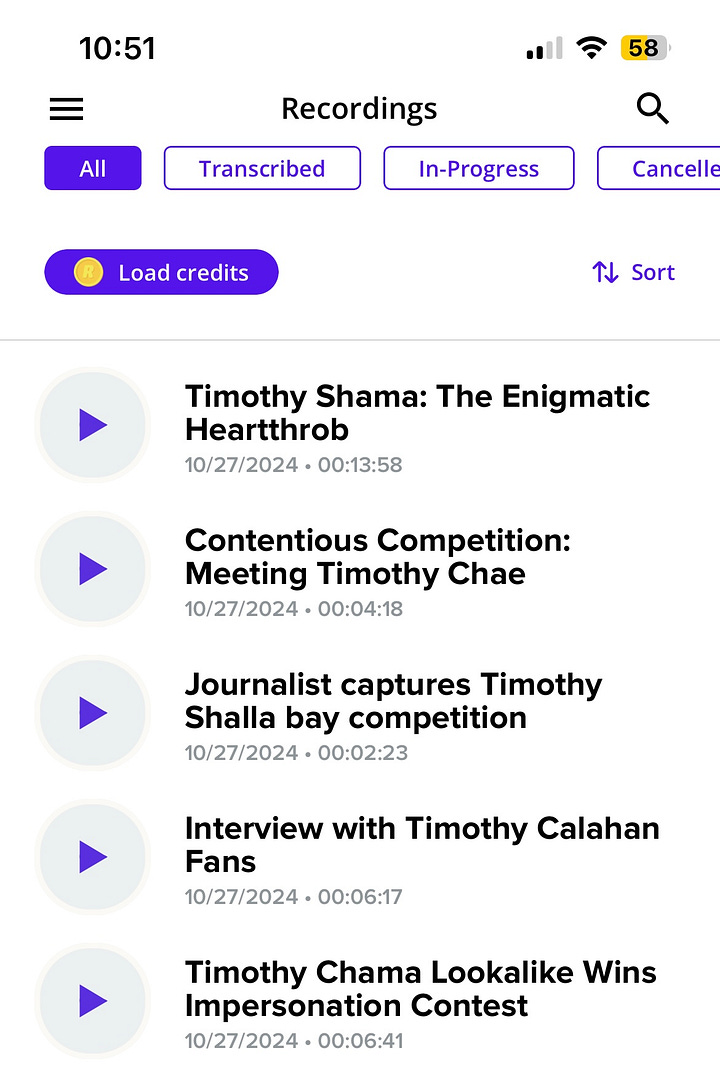
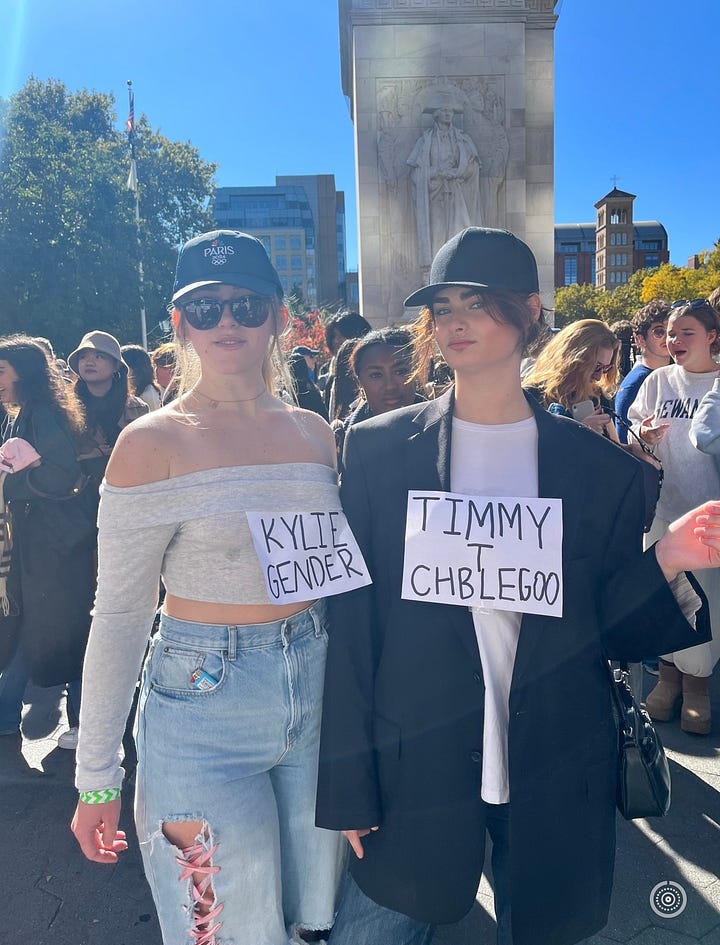
PART II: The Interviews
Chloe Forero, Influencer and Judge of the Contest
Camille: What do you find attractive about Timothée—or what do you think others find attractive about him?
Chloe: The fact that he has dainty, feminine features. He’s skinny—tossable, you might say. Beyond that, he’s got a beautiful hairline, great hair, and a heart-shaped face. I like women, but there’s just something about the way that he looks.
Camille: What surprised you most about today’s competition?
Chloe: I’ve been seeing the poster for quite some time on Twitter, on Instagram. But I did not expect it to be as crowded as it is today. I didn’t think that the Saturday after a holiday weekend, people would get up and go to a public park to see a bunch of Timothées.
Camille: What made you decide Miles Mitchell was the winner?
Chloe: Number one, he’s sexy. Number two, he looks the most like him. I swear to god, I’m actually mad. Also, he was giving a nonchalant vibe that I think Timothée Chalamet would bring if he was in this space today.
Sommer Mae Campbell, Speed-Dating Participant and Contest Attendee
Camille: What brought you here today?
Sommer: I am a woman who works in the area, saw the flyers, and said to myself, that type of opportunity does not come up often. They’re gathering all the Timmies in one place; I gotta go farm.
Camille: So you ran up there and kinda threw your hat in the ring? Is that how it worked?
Sommer: I’ve been very prepared for this. I have my business cards, I have my sign, and I have pushy elbows, so I was able to get to the front. They were kind of doing a dating show at the end there. I don’t know what happened. But I know that many, many Timothées have my contact information, and I’m happy with that.
Camille: Wait, what is your contact information?
Sommer hands me a business card that reads:
SINGLE 24 Y/O WOMAN
DO YOU WANT TO GO ON A DATE WITH ME?
I’M DEAD SERIOUS
TIMOTHEESPLEASEEMAILME@GMAIL.COM
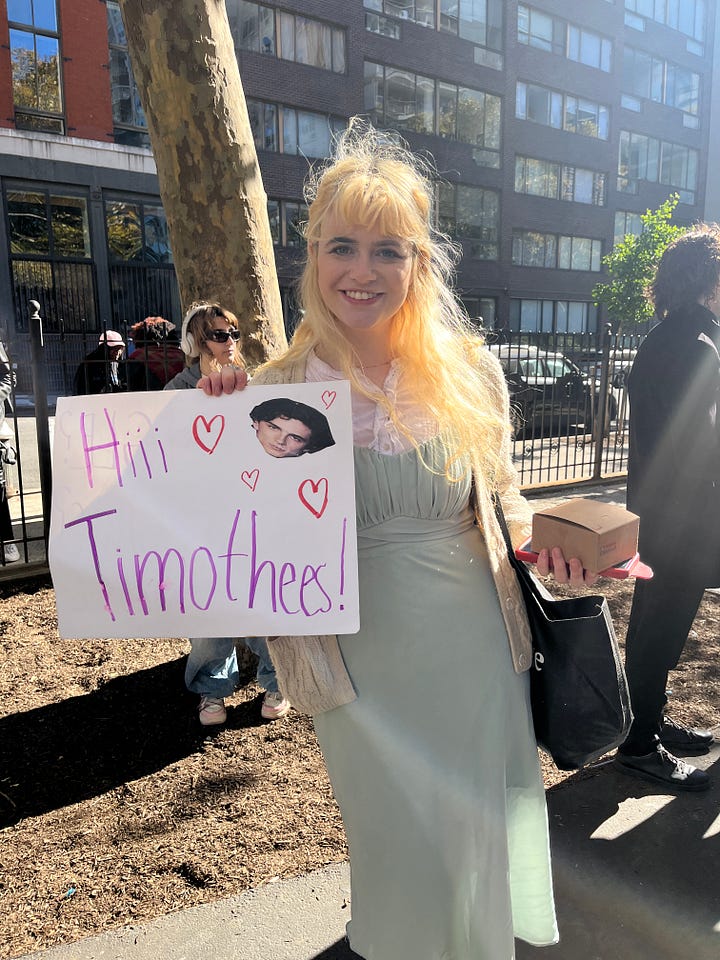
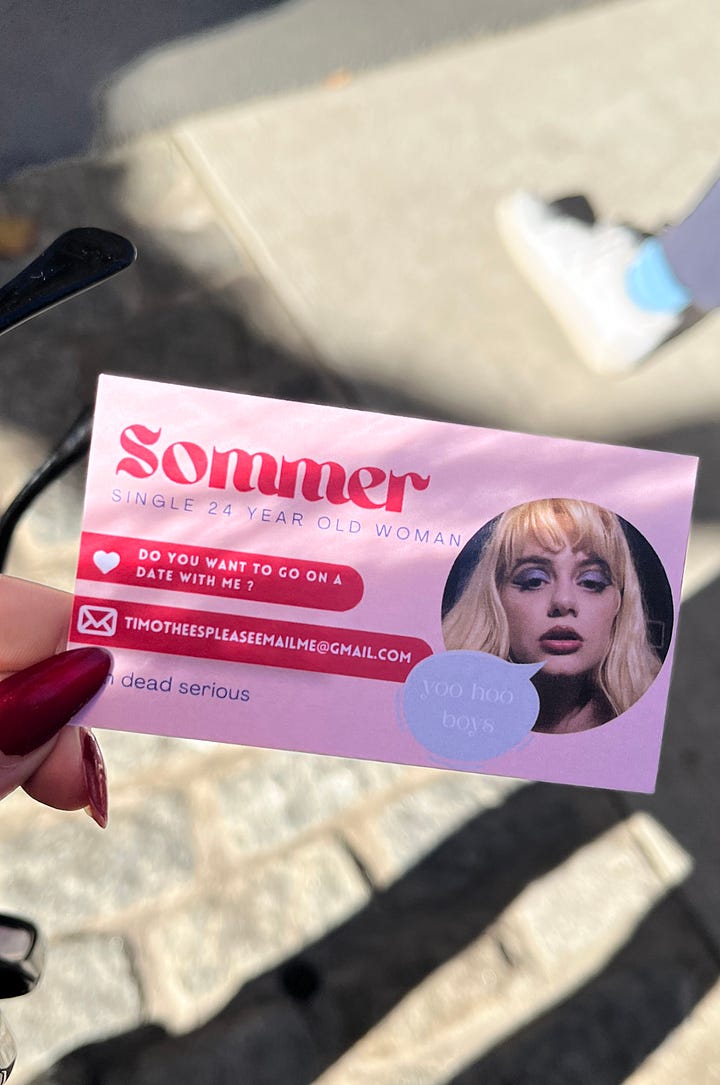
Sommer: It has a bespoke email for the event.
Camille: How did the event compare to what you expected?
Sommer: I have no idea what I expected. It was a little stressful there for a second. I’m glad I didn’t get crowd-crushed. It was fun though, and kind of what you can expect from random people in New York. Like, I love this city. People just do whatever.
Camille: What do you find attractive about Timothée Chalamet?
Sommer: I always say the incel mind cannot comprehend the popularity of Timothée Chalamet, cause he’s tiny, skinny, and frail looking. But, like, sometimes we need something to take care of, and who is gonna tell us, like, a love poem or something.
“I always say the incel mind cannot comprehend the popularity of Timothée Chalamet, cause he’s tiny, skinny, and frail looking. But, like, sometimes we need something to take care of, and who is gonna tell us, like, a love poem or something.”
Camille: I’m actually hearing from a lot of women complimenting his personality over his looks.
Sommer: Yeah. Thing is, he has the vibe of an artsy boy who will listen to your feelings. And then he dated Kylie Jenner, and now I’m like, it’s been a lie. It’s all been a lie, Timothée.
At this point, a man on a pennyfarthing rides past in a top hat, shouting that they’re on their way to bail out the arrested Timothées.
Spencer DeLorenzo, Timothée Chalamet Contest Participant
Camille: What do you think women find attractive about Timmy?
Spencer: No clue. Maybe, like, the submissive and breedable aspect. [laughs] Hate to be honest! I don’t know, I guess it’s like, I’m fun-sized. I’m not big and bulky.
Camille: I like that you’re saying “I” instead of Timothée.
Spencer: I’m sorry, um, the rat boys that I represent.
[Friend interrupts]: It’s the charisma. It’s the chutzpah. I mean, you see the twinkle in this man’s eye? The amount of numbers this man has gotten today…
Spencer: I actually got a business card of this girl. She’s cute, I think I’m going to ask her out to dinner tonight.
Camille: Oh my god, yeah, I interviewed her. Please report back!
Nyla Joppa, Contest Attendee
Camille: What surprised you most about the competition?
Nyla: I knew that 2,000 people had RSVP’d—but I didn't think that everybody was gonna show up. When me and my friend got here, I was like, What if Timothée crashes it? And then he actually did, and I wasn’t really expecting that. I was just joking!
Camille: What do you find attractive about Timothée?
Nyla: Oh, Lil Timmy Tim. I just think that he’s really funny. I mean, he’s kind of a baddie. I like, I like the men who look like… Never mind. [laughs]
Camille: No, tell me.
Nyla: I like men who look like green beans, I guess.
Chris, Sarah and Kira, Three Friends Attending the Contest Together
Camille: What do you find attractive about Timothée Chalamet?
Chris: Everything.
Sarah: His personality, he’s funny. He’s silly. And I like his movies.
Kira: I’m honestly not that attracted to him, I just thought this would be fun to go to.
Miles Mitchell and Zander Lueve, Competition Winner and Runner-up
Camille: How did this contest compare to your expectations?
Miles: It was really overwhelming. I didn’t expect so many people to show up.
Zander: I share the same sentiment. The scale of it... I don’t even know how the hell I got up here.
Camille: If you were to tell the story to your grandkids, what would you tell them about the Timothée Chalamet lookalike competition?
Zander: Well, the way we were rounded up there was kind of wild. I didn’t think we would go marching down from Washington Square. It was like organized chaos.
Camille: How did you hear about it?
Miles: A bunch of my friends just sent me flyers on Instagram and they were like, you should go to this. And I had nothing to do today, so, there you go!
Zander: My girlfriend sent me the flier, and I do get told I look like him often, which is very flattering.
Camille: What do you think women find attractive about Timothée Chalamet?
Miles: Probably, um, his hair.
Zander: I’d say his jaw.
Michael O’Donohue, Timothée Chalamet Lookalike Contestant and My Dear Friend
Camille: What do you think made the difference for the winner today?
Michael: More commitment to the bit, which I think became a big selling point. Dune Timmy [Zander Leuve] looked more like the real Timothée, but he was dressed more normal—so it was like, you’re playing it pretty safe, wearing something that gives you plausible deniability instead of embracing the cringe. I don’t know man, you just look like you’re wearing Rick Owens shit. Whereas Wonka Timmy [Miles Mitchell] was like, I’m all in. When I leave this contest, people are gonna look at me like I’m a freak.
Camille: So they were like, he has to win for his ego, because there’s nothing sadder than slinking away in a Wonka costume?
Michael: I think, in my heart, that’s what was happening—the crowd was rewarding effort. And when Wonka got up there, he started throwing candy into the crowd, which I think endeared him to them.
I also think there was a degree of social engineering going on. When someone got up there, there would be an initial pause, then a boo or a cheer—and whichever was first, the rest of the crowd seemed to join in. When Dune Timmy [Zander Lueve] was handed the mic and he mentioned his girlfriend, I think it kind of influenced the crowd against him—I heard all these women going, “What, a girlfriend!?”
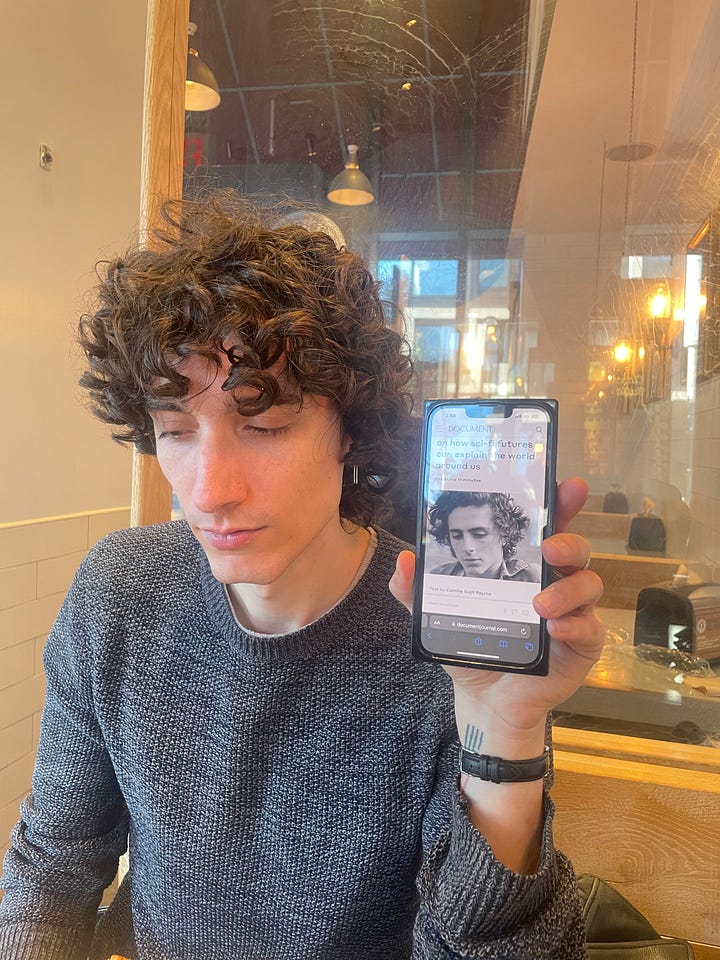
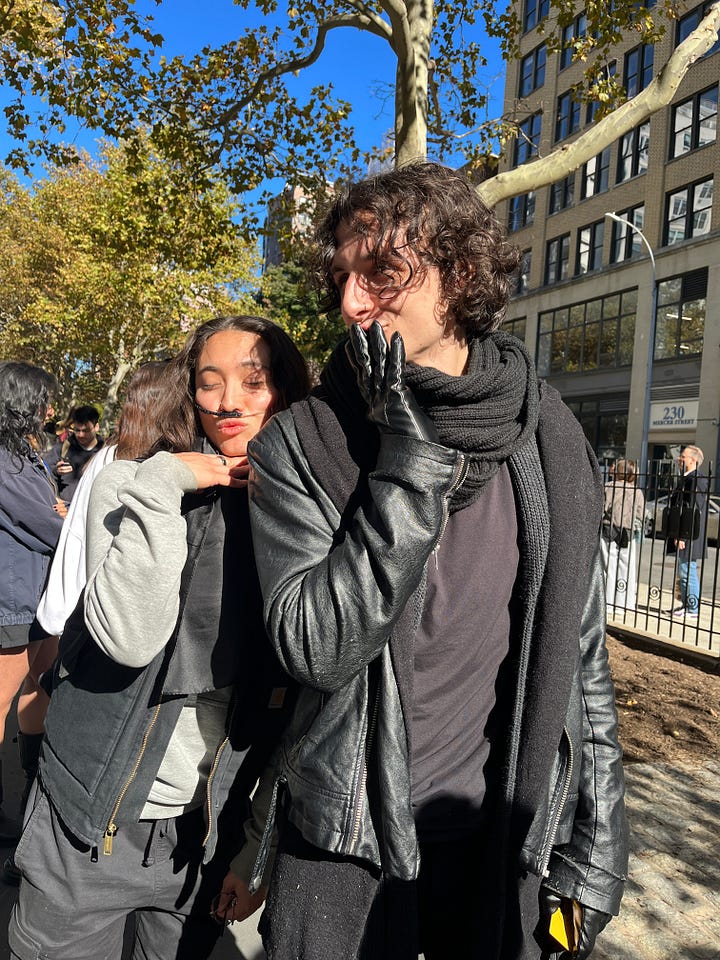
Alia Garrett, Girlfriend of the Runner-up
Camille: So your boyfriend Zander mentioned that you sent him the flier. What was your thinking?
Alia: I go to NYU, and he gets compared to Timothée every single place we go—no matter what’s going on, he will get it. And you know, I can’t deny it myself. So yeah, I had to bring him. I couldn’t not.
Camille: What was the experience like for you?
Alia: I was a little nervous at the beginning, when girls started handing out their Instagrams on like, literal business cards. But you know, he’s a good man, a loyal man.
Camille: What do you think it says about the modern-day dating experience—the direction it took onstage, where it was almost like a dating show?
Alia: It’s a little frightening, but you know, if that’s what it takes to find someone, sure, get creative with it. I did not know it was going to go that way, but I also kind of figured—because if I was single and I saw he was here, I’d come over here, so I get it!
Camille: How did you guys meet?
Alia: Bumble.
Camille: So you’re reppin’ for the apps.
Alia: Yeah, every now and again, it works!
Mackenzie Thomas, Contest Attendee and Substack Writer
Camille: What was most memorable about the competition?
Mackenzie: First of all, I think I’ll remember running through the streets for my whole life—that was just like, so much fun. I was with two people that I love so much, and we decided to wake up early and show up for the Timothée Chalamet lookalike competition because like, why not?
But I was really annoyed that they turned it into a dating thing. I don’t know if that was the plan because the organizers didn’t seem to know what they were doing, but I just felt really embarrassed for the girls who were sticking their necks out for these guys who kind of look like Timothée Chalamet if you’re squinting. It’s fine to make a spectacle of desire, and who’s going to say no to being put in front of an audience? But I thought it put the women in a really pathetic situation, and I didn’t like watching that.
“I think people initially were attracted to Timothée Chalamet because he was the first guy to start the trend of being fake gay. Women love what they cannot have, you know?”
Camille: What do you think makes women so attracted to Timothée Chalamet?
Mackenzie: I think people initially were attracted to Timothée Chalamet because he was the first guy to start the trend of being fake gay. Women love what they cannot have, you know? And he was in Call Me By Your Name and he played a little gay boy, and we all fucking loved it because his character is incredibly vulnerable and it was something that like women could relate to. And he’s not terribly bad looking, so it was like, that emoji with the cheese and the trap. It’s pretty simple math.
I fell for it, because I spent so much in my teenage years reading gay fan fiction—and to see something like that come to life, portrayed by adorable Timothée Chalamet… I had a period in which I was obsessed. But I don’t really think I’m that attracted to him anymore because I’m older now. For me, when a boy looks too young, it kind of passes into like, uncanny valley. So I used to be attracted to him, but now he’s just like a eunuch to me.
PART III: The Analysis
We have a primal desire to see (and rank) ourselves the way others do. The idea of a celebrity doppelgänger is appealing because it allows us to imagine ourselves through another’s eyes, while simultaneously gauging our proximity to modern beauty ideals—or at least a popular archetype, such as the, err, rat boy. But what differentiates these celebrity lookalike contests from straight-up beauty pageants is the chaos and disorganization with which they take shape, and the inherent unseriousness of the endeavor: herding up attractive people with features just left of center enough to be deemed unconventional, then elevating them to the status of sex symbol and gawking at them like exotic zoo animals.
“Putting hot normies on a pedestal creates the illusion that we are not reinforcing Hollywood’s narrow, Eurocentric beauty standards. After all, if the barista at your local coffee shop looks like your favorite movie star, how unattainable could celebrity actually be?”
We are, in the process, creating a taxonomy of types of guy—and from Timothée Chalamet’s feminine countenance to Jeremy Allen White’s compact stature, many of the archetypes on display don’t adhere to our vision of the stereotypical male sex symbol. Celebrating their appeal feels apolitical and inherently lighthearted, compared to, say, knighting the next Chris Evans or Ryan Gosling, because putting hot normies on a pedestal creates the illusion that we are not reinforcing Hollywood’s narrow, Eurocentric beauty standards. After all, if the barista at your local coffee shop looks like your favorite movie star, how unattainable could celebrity actually be?
Witnessing women fawn over “fun-sized” male suitors at the Timothée Chalamet lookalike contest, I felt as though we’d entered an alternate universe where the dominant beauty standard no longer applied. But as lookalike mania sweeps the globe, the contests are changing—centering not just on unconventional male heartthrobs, but objectively beautiful female celebrities like Zendaya. The inclusion of women shifts the tenor of the trend, and feels implicitly less fun—because in a world dictated by patriarchal ideals, women being pitted against each other and judged for their appearance isn’t a novel event, it’s everyday reality. At the end of the day, guys who don’t look like Timothée Chalamet will be fine. But women who don’t look like Zendaya are still tasked with navigating a world where their appearance is stubbornly tied to their social and economic power.
“The inclusion of women shifts the tenor of the trend, and feels implicitly less fun—because in a world dictated by patriarchal ideals, women being pitted against each other and judged for their appearance isn’t a novel event, it’s everyday reality.”
Depending on who you ask, the celebrity lookalike industrial complex could be seen as an extension of dupe culture; a ray of “ridiculous hope” for disenfranchised Americans; or even a sign of the recession. “The lookalike contests are so Great Depression era coded,” the playwright Jeremy O. Harris wrote on X this week, referencing a spate of competitions in the 1930s that saw Charlie Chaplin and Shirley Temple lookalikes compete for cash prizes amid worsening economic conditions. Like Chalamet, Chaplin once showed up to his own lookalike contest. In a hilarious twist, he lost miserably—which is not so different from what I witnessed on-the-ground, with numerous people decrying the presence of Chalamet because, and I quote, “that guy looks nothing like him!”
I, too, balked at the idea that the real Chalamet walked among us—albeit in civilian clothes, and sporting a disturbing mustache. Because somewhere along the way, my mental caricature of Chalamet had superseded the reality, transforming him from person into concept. I wasn’t judging the doppelgängers against the real Timothée Chalamet, I was judging them against my idea of Timothée Chalamet—one that had become inflated and warped by the media circus and memetic spectacle that surrounds him. The actor had been eclipsed by his doppelgänger.

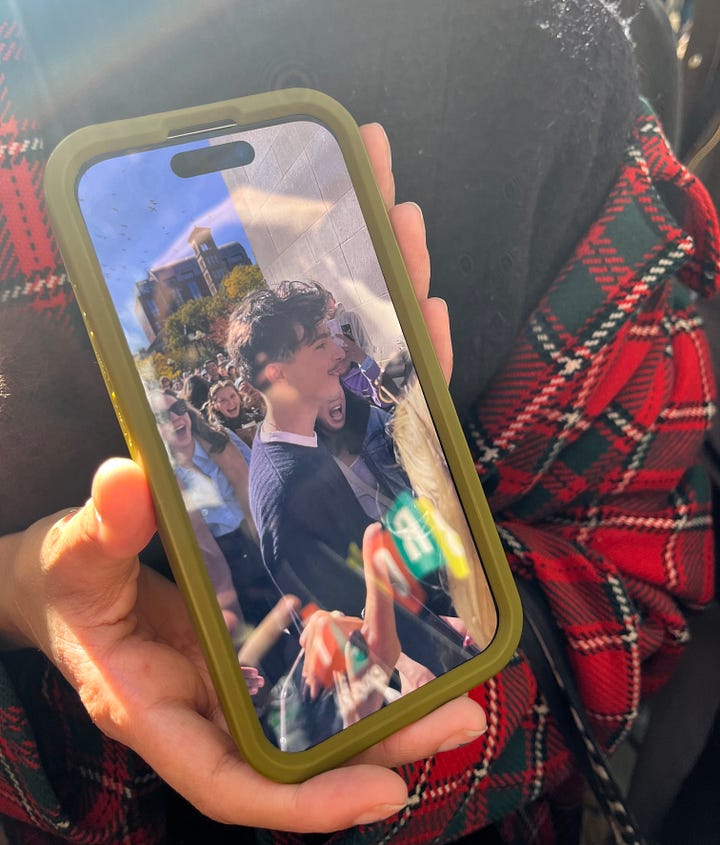
On the internet, our faces are flattened and reduced to archetypes—our features coalescing not into the preternaturally beautiful face of America’s interracial future, as predicted in National Geographic, but the homogeneity of Instagram face. Today’s movie stars often lack the character of previous generations; their faces smoothed and tweaked to reflect a more generic appeal, absent the distinctive traits that would connote a specific personality or background.
Still, there are exceptions: Jeremy Allen White or Barry Keoghan, for example, possess what the French call jolie laide: “beautiful ugly,” or the interplay between attractiveness and unconventionality that imbues someone’s face with a certain charm. Since we’re socially conditioned to accept a more expansive standard for male beauty, this quality is easier to find in Hollywood’s leading men—which also makes them better candidates for lookalike contests.
Interestingly, many of the Chalamet fans I interviewed spoke not of the beauty of his physical features, but the emotional traits, vibe, and behavior they associate with them: He seems like “an artsy boy who will listen to your feelings,” says Sommer, noting that his frail appearance is appealing because women “need something to take care of, and who is gonna tell us, like, a love poem.” Instead of being attracted to his appearance, they were attracted to what it signified, inferring that because he doesn’t fit the masculine stereotype, he was more likely to be vulnerable, sensitive, and attuned to their emotions—in short, not like other guys. This lack of superficiality is kind of sweet—but it also reminded me, uncomfortably, of phrenology, a deductive pseudoscience that falsely held that a person’s morality, personality or intelligence could be determined by analysis of their skull shape or facial physiognomy.
“Many of the Chalamet fans I interviewed spoke not of the beauty of his physical features, but the emotional traits, vibe, and behavior they associate with them. Instead of being attracted to his appearance, they were attracted to what it signified. ”
The men’s assessment of Chalamet was more simple. When asked what they thought women found attractive about the actor, competitors named the physical traits they shared; a sharp-faced Chalamet dupe says women like him for his jawline, a curly-haired one suspects it’s his hair; a short and slight Chalamet says it’s the “submissive, breedable” quality that draws women to him. This might be true—but while these contests ostensibly revolve around the appearance of their participants, I think their emergence as a surreal modern-day dating ritual reflects something more human: our desire to get out there and connect IRL.
According to my single friends, it’s harder than ever to meet people in the wild; no one wants to take the risk of approaching a stranger in a bar anymore. On the apps, we can experience the intoxicating validation of matching with someone attractive, without actually needing to put ourselves out there—allowing us to gauge our place in the romantic marketplace without risking rejection or indeed, any real interaction at all.
“Like the apps, celebrity lookalike competitions appeal to a primal desire to understand how others view us. But they also inadvertently evoke something else: the spontaneity of meeting in person.”
These days, roughly 40 percent of couples meet on the apps—but no one seems particularly happy about it, because they’ve delivered us to a dating environment starved of true romanticism, spontaneity, and interpersonal investment. The algorithm transmutes—or perhaps just mutes—desire into a speculative asset, something that can be evaluated and assessed from a distance. And as we grow accustomed to vetting romantic candidates through the safe portal of our screens, it’s easy to forget that true chemistry arises out of the dynamic between two people, not their individual aesthetic perfection.
Like the apps, celebrity lookalike competitions appeal to a primal desire to understand how others view us. But they also inadvertently evoke something else: the spontaneity of meeting in person, the thrill of not knowing what’s going to happen, and the chaos of being thrown into a wild situation with hundreds of strangers—some of whom just so happen to look like your celebrity crush. Melding social participation with plausible deniability and the hilarity of a viral spectacle, they’re an entertaining, low-stakes excuse to get out of your comfort zone, or at least out of the house. And if today’s hopeful singles are embarrassed to admit they manifested their meet-cute at a beauty pageant for pointy-looking white boys, well, they can just tell their grandkids they met on Tinder.



this is true journalism
Привет